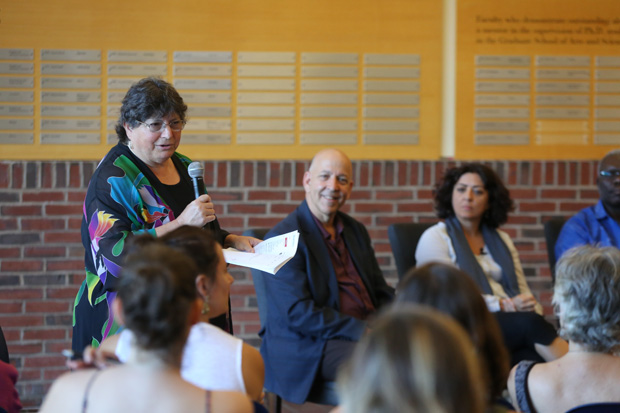Creating a network for art makers in areas of conflict
 Photo/Mike Lovett
Photo/Mike LovettCynthia Cohen, director of the Program in Peacebuilding and the Arts, speaks at a design lab held earlier this year.
In the face of violent conflict, the arts can play powerful, constructive roles. A project overseen by the Peacebuilding in the Arts program at Brandeis is leading the way to create a support system for the people behind such cultural productions.
"The biggest challenges of the twenty-first century -- war, inequality, climate change, migration -- these problems require solutions that can't be found through linear processes alone," said Cynthia Cohen, director of the Program in Peacebuilding and the Arts. “Solutions will arise through creative, transdisciplinary approaches, and arts and culture will likely play leading roles.”
IMPACT (Imagining Together Platform for Arts, Culture and Conflict Transformation) is an 18-month initiative to design an infrastructure to organize and support the diverse, global, and growing arts and culture already contributing to more vibrant, less violent communities and a more just, sustainable and peaceful world. The infrastructure will engage university-based programs, researchers, cultural institutions, artists, funders and policy-makers in regions around the world.
Launched in September 2017 with a year of intensive, global research, the initiative has already started to connect people from all over the world. Its team of researchers includes scholar-practitioners from Cambodia, Kenya, Cyprus, Australia, Japan and France. The project is led by Brandeis’ Program in Peacebuilding and the Arts, in collaboration with the Baker Institute of Peace and Conflict at Juniata College and Maseno University in Kisumu, Kenya, and is funded by a grant from the Andrew W. Mellon Foundation.
A three-day design lab, held on campus at the beginning of the fall semester, brought together 25 practitioners, scholars, and policy-makers from Argentina, Australia, Colombia, Europe, Kenya, Israel, the US, Pakistan and the Philippines to discuss the needs of the field and ways to strengthen practice and influence policy. Participants generated ideas for fostering exchanges, strengthening ties between researchers and practitioners, and improve relationships between donors and grantees.
Cohen envisions the initiative will lead to a global network of cultural leaders, researchers, and artists that will be held together by a shared set of values related to the unequal distribution of resources across the field. The emerging plan will address the sense of isolation that face many working in the field, through a network of regional hubs and a series of virtual learning exchanges, both of which will foster inclusion and connectivity. This infrastructure would connect existing networks, build communities of practice, and engender systems of influence that will have an impact on cultural policies and funding resources.
IMPACT aims to have established a framework by early 2019, which will include recommendations for approaches to strengthening coordination among university-based cultural entities and others working in the field of arts, culture and conflict transformation. It will propose priority activities for the next 3 to 5 years; and a dynamic set of ethical principles and tools for implementing them and improving them, based on practice. As that work is underway, Cohen said they will aim to find ways to make priority structures and processes sustainable.
“We're intending to establish an advocacy arm to generate more resources for creative approaches to urgent social issues and to link with related fields such as human rights, sustainable development, transitional justice, and arts education. We’d like to see opportunities for global learning exchanges become an on-going part of IMPACT,” Cohen said. “We would like to find ways for them to become self-sustaining."





